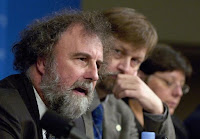A United Nations panel of scientists seeking ways for nations to limit global warming to 1.5 degrees Celsius should not dissuade governments from concentrating on bleaker scenarios of higher temperatures as well, its former chief said.
Nations should be considering the potential impact of temperature rises of as much as 4 degrees Celsius (7.2 Fahrenheit), said Robert Watson, former head of the U.N. Intergovernmental Panel on Climate Change.
The U.N. panel was assigned to find ways to limit global warming to 1.5°C (2.7°F) after a 195-nation climate change summit in Paris in December.
Most of those nations signed the climate change deal in April, pledging to seek a 2°C degrees limit and make efforts toward a 1.5°C level as well.
Some scientists have questioned whether limiting global warming to 1.5°C is realistic and if the world's industrialized nations are willing to make such deep cuts in greenhouse gas emissions.
Speaking at a Rutgers University conference with the current IPCC chair, Hoesung Lee, Watson said: "Is it feasible technically? Worth analyzing, basically?"
"I hope we don't lose sight however of what are the impacts of a 3 to 4 degree world," said Watson, who chaired the IPCC from 1997 to 2002.
"The reason is if we don't get the Paris agreement implemented, we may well see 3 and 4 degrees Celsius."
Read more at Governments Should Study Worst-Case Warming: U.N.

No comments:
Post a Comment